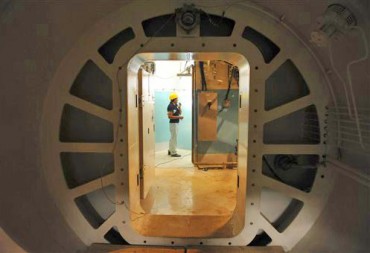Via haaretz.com
While chaos and change reigned supreme, Iran succeeded in repairing its uranium-enrichment plant after the cyber attack by the Stuxnet computer worm.

The uprisings in Tunisia, Egypt and Libya have focused Israeli attention on the west, and overshadowed the disturbing news from the east: Iran has succeeded in repairing its uranium-enrichment plant at Natanz, whose functioning had been disrupted by the Stuxnet computer worm. The 1,000 centrifuges that were destroyed – about one-tenth of those in the installation – have been replaced by new ones. The Iranians are maintaining their rate of production and continuing to stockpile enriched uranium.
The reports on the success of Stuxnet, the attacks on atomic scientists in the heart of Tehran, and the assessment of outgoing Mossad chief Meir Dagan that Iran will not obtain a nuclear bomb before 2015, have created the impression that certain recent activities, combined with economic sanctions against Tehran, have succeeded in blocking the Iranian threat or at least delaying it by a number of years. The idea that Israel would embark on a preemptive war and bomb the atomic facilities in Iran appeared irrelevant.
This impression is deceptive and the optimism is unwarranted. We have not “won” yet and the military option vis-a-vis Tehran has not been dismissed. Its proponents explain that an Iranian nuclear bomb would change the face of the Middle East forever. After Iran will come Turkey, Egypt and Saudi Arabia, and the identities of the regimes that will rule there are less important than the geopolitics: None of them will agree to the dominant status afforded to Iran by the bomb, and they will also want one. When the bombs proliferate, the danger of them falling into terrorist hands will also increase.
An Israeli attack will not be able to wipe out the knowledge possessed by the Iranian scientists and engineers. Experience does teach us, though, that it is hard to rehabilitate destroyed atomic installations. Iraq and Syria, whose nuclear reactors were bombed by Israel, could have rebuilt them elsewhere but did not, even though they had the blueprints and calculations in hand. The secondary structures discovered in Syria this week were erected at the time that the reactor was originally being built. Iraq tried a secret channel for enriching uranium, which did not come to fruition before the 1991 Gulf War derailed the effort.
By the same logic, an Israeli bombing of Iran, which, according to experts’ assessments, would delay the project by three or four years, could also conceivably spell the end of it – just like in Iraq and Syria. The concerns Israel has about an attack on Iran have less to do with the chances of the success of the long-range action, and more to do with what would happen on the home front: Thousands of rockets and missiles launched by Hezbollah, Iran, Hamas and perhaps Syria as well, would hammer residential and economic centers, air force
bases and Ben-Gurion airport. The economy would be paralyzed, there would be many casualties and the war could last for years. A successful strike requires the right combination of capabilities, international legitimacy and timing. Israel’s capabilities are not known. Furthermore, there would not be formal legitimacy of any action, but “the world” would not necessarily excoriate Israel if it bombs Iran. In all probability, the condemnations would be inversely related to the success of the operation.
The U.S. administration, which opposes an Israeli strike, is still careful about saying an explicit “no.” In conversations with top Israeli officials, the Americans offer their assessments of the situation and support the use of economic sanctions, while their interlocutors talk about the right to self-defense. Both sides maintain a sense of ambiguity. The administration does not want to be caught with prior knowledge of Israel’s intentions, and for his part, Netanyahu does not raise tricky questions like: “Do we have a green light to act?” The messages are implicit and can be denied in case of complications. And the timing? In winter you don’t go to war, according to the cliche, because of the clouds that impede the air force.
In a little while, spring will arrive and after that summer, with an election race for the next Knesset looming on the horizon. Menachem Begin bombed Iraq on the eve of the election in 1981, when public opinion polls were predicting a defeat for him, and when his rival, Shimon Peres, opposed that action (today, from his presidential seat, he also opposes attacking Iran ). The Iraqi reactor was destroyed and Begin won the election. Meanwhile, as their political activism wanes, Netanyahu and Barak could very well deduce that opposition leader Tzipi Livni will not decide to bomb and that a successful strike will help keep Likud-Atzmaut in power.
All this notwithstanding, in the meantime there are no signs that Netanyahu, who until now has stuck to a “zero risk” policy, will dare embark on such an adventure.




